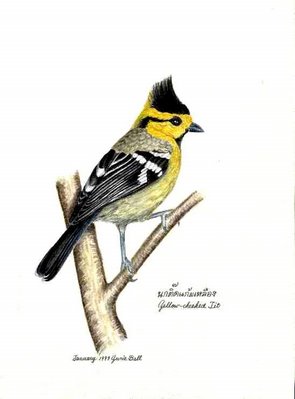The Scarlet Gentleman

Yellow-cheeked Tit by Yurie Ball
(December 22nd Mae Hia) A new bird for the area, a Pompadour Pigeon sitting high up in a tree, bringing the numbers up to 203spp. The Black Eagle was seen again and at the time it was flying over a dead tree which contained a Crested Serpent-Eagle. The latter bird then flew off and it was interesting to see that the Black Eagle was appreciably bigger.
(December 25th HTT) 12 Grey Herons seen flying in the direction of the army lakes. They have obviously decided that the main lake is too busy, we used to see 3 or 4 in the trees or at the lakeside before, now we’re lucky if we see one. The Lesser Whistling Ducks are still favouring us with their presence, 200+ seen today, but I wonder how long they will put up with the ever increasing activity around the lake. The immature Eurasian Kestrel is still to be found on its haystack early in the morning.
(December 26th Mae Hia) An immature Little Grebe seen on Little Grebe Pond, much lighter than the adult, but no adult birds seen. The farmyard scene was replicated with a Hoopoe and 3 male Junglefowl feeding around the cows feeding on the rather too aromatic cabbage leaves infested with flies.
(December 28th KMP) Can’t wait! This was a very special bird, a male Scarlet Finch up at the start of the Chae Sorn national park at about 1,700m just before the km.5 marker. I saw this red blob sitting at the top of a dead tree, got my scope on it and couldn’t believe my eyes. If my legs would have allowed me I would have pranced like a young gazelle but as it was a mere shuffle had to suffice. John was quite amused at my excitement but even he had to admit it was well worth looking at. And two other new birds for the area, the Asian House-Martin and the Black-headed Sibia bringing the numbers to 180spp.
The first 7 kilometres along this road comes alive with birds early in the morning. Bar-backed Partridges can be heard duetting, one with the repetitive ti-hu, ti-hu, ti-hu, and the other with a faster kew-kew-kew, sadly they are more often heard than seen. I put this down to hunting and they now keep well away from the road. Other birds that add their voices to the chorus are the Great Barbet, the Blue-throated Barbet, occasionally the Golden-throated and the Blue-eared Barbet. Another bird seen, and heard, this morning was the Large Cuckoo-Shrike – it announces itself with a strident klee-eep call. Also seen a flock of Yellow-cheeked Tits.

1 Comments:
coach outlet, abercrombie and fitch, hollister pas cher, michael kors outlet, nike air max, vans pas cher, ray ban pas cher, ugg boots, north face, michael kors outlet, michael kors, replica handbags, michael kors outlet, ugg boots, burberry, mulberry, lacoste pas cher, nike air max, nike air max, true religion jeans, michael kors, oakley pas cher, hermes, tn pas cher, lululemon, north face, hogan, burberry outlet online, nike roshe, ralph lauren uk, kate spade handbags, hollister, vanessa bruno, true religion jeans, true religion jeans, timberland, air force, michael kors outlet, new balance pas cher, michael kors, michael kors, sac guess, true religion outlet, coach purses, converse pas cher, nike free run uk, michael kors outlet, coach outlet, nike blazer, ray ban uk
Post a Comment
<< Home